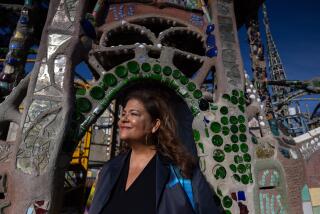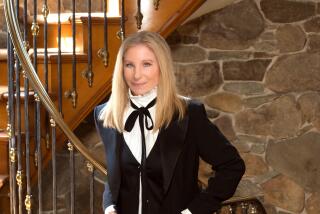Live video chat: The legacy of poet, pioneer Maya Angelou
- Share via
The life and legacy of Maya Angelou were the topics of a live video chat Wednesday hosted by Los Angeles Times staff writer Carolyn Kellogg. Her guest was author Tayari Jones, a novelist and creative writing professor at Rutgers University.
Jones’ most recent book is “Silver Sparrow.” She is winner of the Hurston-Wright Legacy Award for Debut Fiction, and an NAACP Image Award finalist.
Jones had this piece of advice for newcomers to Angelou’s works: “Start from the begining and walk yourself through,” she advised, a process that will allow readers to follow along with Angelou’s artistic evolution.
Angelou, a memoirist and performer, died Wednesday at the age of 86. She was a multi-talented artist as well as a celebrated civil rights advocate and pioneer.
Her words of wisdom crossed over into the pop culture mainstream in recent years while she was a frequent companion to media mogul Oprah Winfrey, and when she was interviewed for a documentary about the death of Tupac Shakur, with whom she had a mentor-like relationship.
Authors around the world have taken to social media to pay tribute to Angelou.
The obituary on Angelou called her a “diva of American culture” whose memoirs “portrayed a complex, freewheeling life.”
Angelou’s talents were many, as noted in the article: She was an actress, singer and dancer, who toured internationally in “Porgy and Bess” and played Kunta Kinte’s grandmother in the television miniseries “Roots.”
She was also a film director, playwright and professor, as well as a Pulitzer Prize-nominated poet (for “Just Give Me a Cool Drink of Water ‘fore I Diiie”). She also wrote verses for Hallmark cards and gave the 1993 inauguration of President Clinton.
But her most enduring achievement was “I Know Why the Caged Bird Sings” (1969), the first of several memoirs.
From the obituary’s description of the book: “Universal in its themes yet compellingly particular in its details about being a black girl in a white world, it is a story of survival that embraces what she called a ‘culture of disclosure,’ exposing the ugliness as well as the beauty in a prodigiously inventive life.”
More to Read
Sign up for our Book Club newsletter
Get the latest news, events and more from the Los Angeles Times Book Club, and help us get L.A. reading and talking.
You may occasionally receive promotional content from the Los Angeles Times.











